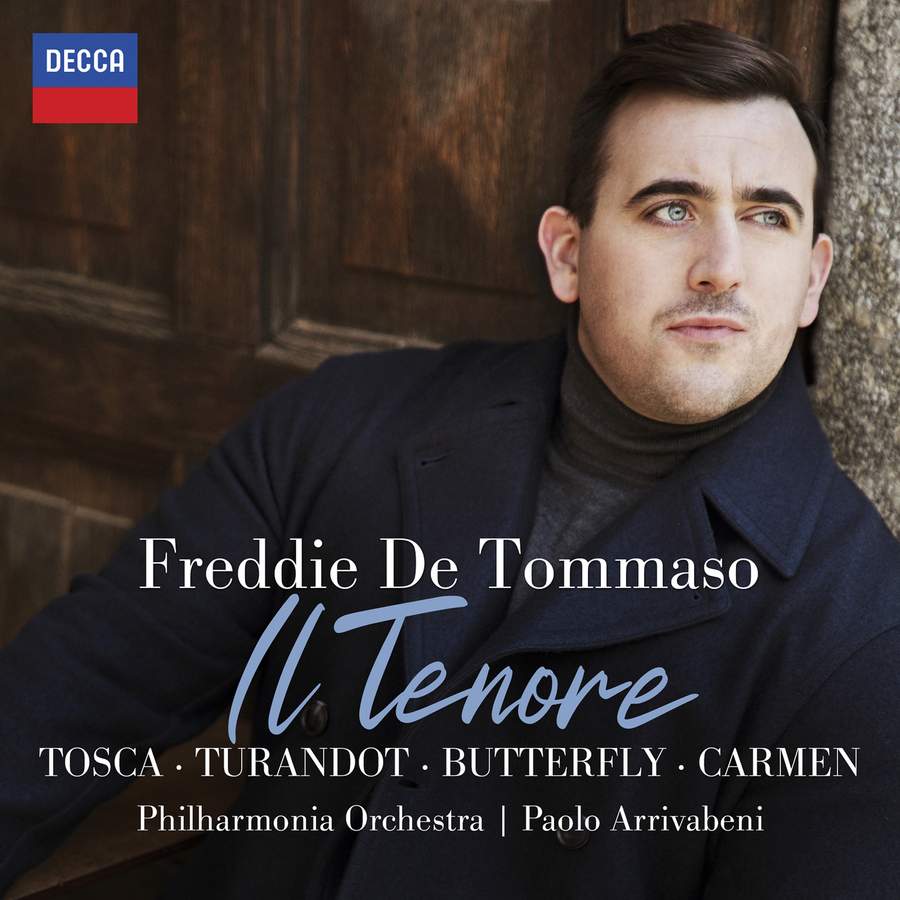Freddie De Tommaso: Il Tenore
View record and artist detailsRecord and Artist Details
Genre:
Opera
Label: Decca
Magazine Review Date: 08/2022
Media Format: CD or Download
Media Runtime: 50
Mastering:
DDD
Catalogue Number: 485 2945

Tracks:
| Composition | Artist Credit |
|---|---|
| Tosca, Movement: Recondita armonia |
Giacomo Puccini, Composer
Freddie De Tommaso, Tenor Lise Davidsen, Soprano Paolo Arrivabeni, Conductor Philharmonia Orchestra |
| Tosca, Movement: Mario! Mario! Mario! ...Son qui! ... Mia gelosa! |
Giacomo Puccini, Composer
Freddie De Tommaso, Tenor Lise Davidsen, Soprano Paolo Arrivabeni, Conductor Philharmonia Orchestra |
| Tosca, Movement: ~ |
Giacomo Puccini, Composer
Freddie De Tommaso, Tenor Lise Davidsen, Soprano Paolo Arrivabeni, Conductor Philharmonia Orchestra |
| Tosca, Movement: E lucevan le stelle |
Giacomo Puccini, Composer
Freddie De Tommaso, Tenor Paolo Arrivabeni, Conductor Philharmonia Orchestra |
| Turandot, Movement: Non piangere, Liù! |
Giacomo Puccini, Composer
Freddie De Tommaso, Tenor Paolo Arrivabeni, Conductor Philharmonia Orchestra |
| Turandot, Movement: Nessun dorma! |
Giacomo Puccini, Composer
Apollo Voices Freddie De Tommaso, Tenor Paolo Arrivabeni, Conductor Philharmonia Orchestra |
| Madama Butterfly, Movement: ~ |
Giacomo Puccini, Composer
Freddie De Tommaso, Tenor Natalya Romaniw, Soprano Paolo Arrivabeni, Conductor Philharmonia Orchestra |
| Madama Butterfly, Movement: Vieni, amor mio! |
Giacomo Puccini, Composer
Freddie De Tommaso, Tenor Natalya Romaniw, Soprano Paolo Arrivabeni, Conductor Philharmonia Orchestra |
| Madama Butterfly, Movement: Addio, fiorito asil |
Giacomo Puccini, Composer
Freddie De Tommaso, Tenor Paolo Arrivabeni, Conductor Philharmonia Orchestra |
| Carmen, Movement: ~ |
Georges Bizet, Composer
Freddie De Tommaso, Tenor Paolo Arrivabeni, Conductor Philharmonia Orchestra |
| Carmen, Movement: C'est toi! (Finale). |
Georges Bizet, Composer
Aigul Akhmetshina, Mezzo soprano Apollo Voices Freddie De Tommaso, Tenor Paolo Arrivabeni, Conductor Philharmonia Orchestra |
Author: Tim Ashley
The young British-Italian tenor Freddie De Tommaso caused something of a stir last year with his debut album ‘Passione’ (7/21), an engaging programme of Neapolitan and Italian songs, familiar or otherwise. Its successor, ‘Il Tenore’, finally takes him into operatic territory with three roles (Pinkerton, Cavaradossi, Don José) that he has already sung on stage and a fourth (Calaf) to which many would doubtless already consider him suited. This is not, it should be pointed out, a straightforward recital of arias but a collection of extracts that pairs him in turn with Lise Davidsen (Tosca), Natalya Romaniw (Cio-Cio-San) and Aigul Akhmetshina (Carmen) for a series of duets and scenes as well as solos.
Much has already been made of the basic sound of De Tommaso’s voice, which is dark, handsome, very Italianate, harking back, in the opinion of some, to the big voices of the ’50s and ’60s such as Gino Penno, Franco Corelli (his hero, to whom his first album was in part dedicated) and Mario Del Monaco, though much of the time he wisely avoids their excesses. His singing, in fact, is admirably secure here, cleanly projected and carefully focused in terms of dynamics. His Don José has more of Gedda’s containment than Corelli’s histrionic flamboyance, and the quiet ascent to high B flat at the end of the Flower Song, for instance, is beautifully done. Just occasionally in ‘Recondita armonia’ and ‘Nessun dorma’ you wish he would let the top out more: his voice, as yet, doesn’t always soar with the ease that you feel it might.
Hearing him in scenes as well as arias, meanwhile, allows us to take stock of his powers of characterisation. He makes an ardent, sincere-sounding Pinkerton opposite Romaniw’s rapturous Cio-Cio-San in the Butterfly love duet, starting, for some inexplicable reason, at ‘Vogliatemi bene’, when we really could have done with the whole scene: there is certainly space on the physical disc for it. His José, with Akhmetshina’s self-assured, super-cool Carmen, is comparably fine, nicely reined in, the obsession lurking behind the desire in the Flower Song then escalating into danger in the final scene. The Act 1 Tosca duet is perhaps less successful, partly because Davidsen, though sounding sumptuous as one might expect, rarely suggests much in the way of jealousy or emotional volatility, which leaves De Tommaso out on a limb at times.
Paolo Arrivabeni could press on with a bit more urgency here, as well. He can be cautious on occasion, sometimes sculpting phrases at the expense of drama or momentum, though the Philharmonia’s playing is exemplary, as are the handful of choral contributions from Apollo Voices. In his review of ‘Passione’, meanwhile, Mark Pullinger expressed concerns, with which I wholeheartedly agree, that De Tommaso should not be pushed or persuaded into tackling too much too soon. This is, however, a fine album that confirms his emergence as a talent to be potentially reckoned with in years to come.
Discover the world's largest classical music catalogue with Presto Music.

Gramophone Digital Club
- Digital Edition
- Digital Archive
- Reviews Database
- Full website access
From £8.75 / month
Subscribe
Gramophone Full Club
- Print Edition
- Digital Edition
- Digital Archive
- Reviews Database
- Full website access
From £11.00 / month
Subscribe
If you are a library, university or other organisation that would be interested in an institutional subscription to Gramophone please click here for further information.




